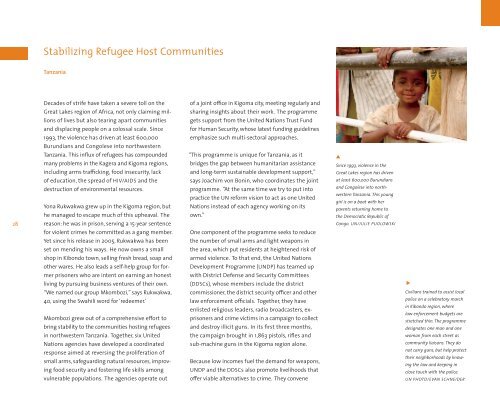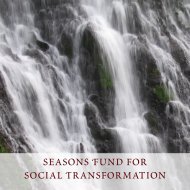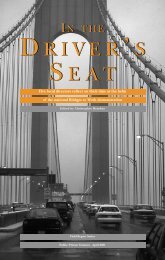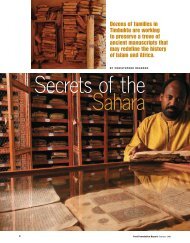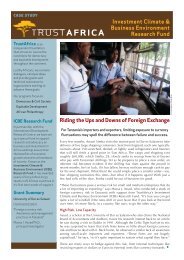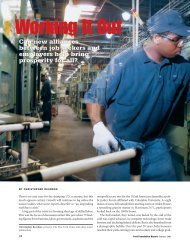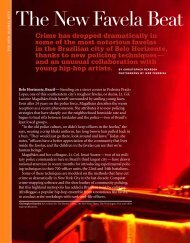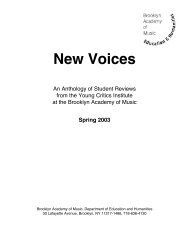Stabilizing Refugee Host Communities
Stabilizing Refugee Host Communities
Stabilizing Refugee Host Communities
Create successful ePaper yourself
Turn your PDF publications into a flip-book with our unique Google optimized e-Paper software.
<strong>Stabilizing</strong> <strong>Refugee</strong> <strong>Host</strong> <strong>Communities</strong><br />
Tanzania<br />
Decades of strife have taken a severe toll on the<br />
of a joint o≤ce in Kigoma city, meeting regularly and<br />
Great Lakes region of Africa, not only claiming mil-<br />
sharing insights about their work. The programme<br />
lions of lives but also tearing apart communities<br />
gets support from the United Nations Trust Fund<br />
and displacing people on a colossal scale. Since<br />
for Human Security, whose latest funding guidelines<br />
1993, the violence has driven at least 600,000<br />
emphasize such multi-sectoral approaches.<br />
28<br />
Burundians and Congolese into northwestern<br />
Tanzania. This influx of refugees has compounded<br />
many problems in the Kagera and Kigoma regions,<br />
including arms tra≤cking, food insecurity, lack<br />
of education, the spread of HIV/AIDS and the<br />
destruction of environmental resources.<br />
Yona Rukwakwa grew up in the Kigoma region, but<br />
he managed to escape much of this upheaval. The<br />
reason: he was in prison, serving a 15-year sentence<br />
for violent crimes he committed as a gang member.<br />
“This programme is unique for Tanzania, as it<br />
bridges the gap between humanitarian assistance<br />
and long-term sustainable development support,”<br />
says Joachim von Bonin, who coordinates the joint<br />
programme. “At the same time we try to put into<br />
practice the UN reform vision to act as one United<br />
Nations instead of each agency working on its<br />
own.”<br />
One component of the programme seeks to reduce<br />
i<br />
Since 1993, violence in the<br />
Great Lakes region has driven<br />
at least 600,000 Burundians<br />
and Congolese into northwestern<br />
Tanzania. This young<br />
girl is on a boat with her<br />
parents returning home to<br />
the Democratic Republic of<br />
Congo. UN/JULIE PUDLOWSKI<br />
Yet since his release in 2005, Rukwakwa has been<br />
the number of small arms and light weapons in<br />
set on mending his ways. He now owns a small<br />
the area, which put residents at heightened risk of<br />
shop in Kibondo town, selling fresh bread, soap and<br />
armed violence. To that end, the United Nations<br />
other wares. He also leads a self-help group for for-<br />
Development Programme (UNDP) has teamed up<br />
mer prisoners who are intent on earning an honest<br />
living by pursuing business ventures of their own.<br />
“We named our group Mkombozi,” says Rukwakwa,<br />
40, using the Swahili word for ‘redeemer.’<br />
Mkombozi grew out of a comprehensive e≠ort to<br />
bring stability to the communities hosting refugees<br />
in northwestern Tanzania. Together, six United<br />
Nations agencies have developed a coordinated<br />
response aimed at reversing the proliferation of<br />
small arms, safeguarding natural resources, improving<br />
food security and fostering life skills among<br />
vulnerable populations. The agencies operate out<br />
with District Defense and Security Committees<br />
(DDSCs), whose members include the district<br />
commissioner, the district security o≤cer and other<br />
law enforcement o≤cials. Together, they have<br />
enlisted religious leaders, radio broadcasters, exprisoners<br />
and crime victims in a campaign to collect<br />
and destroy illicit guns. In its first three months,<br />
the campaign brought in 1,863 pistols, rifles and<br />
sub-machine guns in the Kigoma region alone.<br />
Because low incomes fuel the demand for weapons,<br />
UNDP and the DDSCs also promote livelihoods that<br />
o≠er viable alternatives to crime. They convene<br />
u<br />
Civilians trained to assist local<br />
police on a celebratory march<br />
in Kibondo region, where<br />
law enforcement budgets are<br />
stretched thin. The programme<br />
designates one man and one<br />
woman from each street as<br />
community liaisons. They do<br />
not carry guns, but help protect<br />
their neighborhoods by knowing<br />
the law and keeping in<br />
close touch with the police.<br />
UN PHOTO/EVAN SCHNEIDER
Six UN agencies have developed<br />
a coordinated response to<br />
help mitigate the threats facing<br />
refugee host communities in<br />
northwestern Tanzania.
workshops throughout the two regions where vul-<br />
and process food. Much of this work takes place<br />
nerable men and women learn how to form self-<br />
through agricultural extension projects that build<br />
help groups, develop entrepreneurial skills and gain<br />
vocational and life skills. It has enabled people like<br />
access to microcredit. Rukwakwa formed Mkombozi<br />
Stamili Yasin, an 18-year-old in Kandaga village, to<br />
with several other ex-prisoners after taking part in<br />
produce more food, generate additional income and<br />
one of these sessions in 2005. Some of his peers took<br />
improve the health of their families. Altogether, it<br />
out a loan to open a garage, just around the corner<br />
reaches an estimated 15,000 families.<br />
from his shop, where they repair cars and trucks.<br />
Several former prostitutes started a group of their<br />
A fourth component of the programme focuses on<br />
own, Wimana, and opened a restaurant nearby.<br />
environmental security. Access to safe water and use<br />
of proper sanitation is as low as 40 percent in north-<br />
A second component of the programme addresses<br />
western Tanzania. The e≠ects of forced migration<br />
the low rate of school enrollment in Kagera and<br />
from neighboring countries have put an additional<br />
Kigoma, which has longterm implications for the<br />
strain on land and water resources. UNICEF is work-<br />
region’s socioeconomic development. Through<br />
ing with a non-governmental organization known as<br />
complementary basic education courses developed<br />
TWESA, short for Tanzania Water and Environmental<br />
by the United Nations Children’s Fund (UNICEF),<br />
Sanitation, to protect and rehabilitate these environ-<br />
many adolescents have begun catching up with<br />
mental assets. Together with UNDP and local govern-<br />
their peers and entering formal schools, often for<br />
ment, they are also developing laws to improve water<br />
the first time. The courses also develop life skills to<br />
supply and sanitation. Because of these e≠orts,<br />
30<br />
help students avoid such perils as HIV/AIDS.<br />
every village in Kibondo district has passed a set of<br />
environmental by-laws—a first in Tanzania.<br />
Juliet John, now 16, had been working as a domestic<br />
servant in Rulenge village since she was seven years<br />
old. Putting in 17-hour days, she had no time for<br />
study or play. But in 2001 she was able to reduce her<br />
working hours and attend a basic education course<br />
sponsored by UNICEF. After three years of study, she<br />
passed a national examination allowing her to enter<br />
grade five at an ordinary primary school; she just<br />
completed her first year there.<br />
In each aspect of the programme, the O≤ce of the<br />
United Nations High Commissioner for <strong>Refugee</strong>s<br />
(UNHCR) works closely with the other agencies to<br />
ensure that UN support follows a cohesive strategy.<br />
In the long run, all six UN agencies hope to scale back<br />
their roles in the region. Accordingly, a core principle<br />
of the joint programme is to help local government<br />
and communities develop the capacity to identify,<br />
protect and empower vulnerable groups in a timely<br />
i<br />
Children brushing their teeth<br />
at a water pump in Kigoma,<br />
where UN agencies are working<br />
with government and civil<br />
society groups to improve<br />
water supply and sanitation.<br />
UN/JULIE PUDLOWSKI<br />
u<br />
A farmer tending his field in<br />
Tanzania, where UN agencies<br />
are working together to<br />
promote better ways to raise<br />
livestock, grow crops, store<br />
harvests and process food.<br />
UN/JULIE PUDLOWSKI<br />
A third element of the programme seeks to improve<br />
and e≠ective manner in the future. “This programme<br />
food security at the household level. Three agen-<br />
is unique in combining the technical knowledge,<br />
cies—the Food and Agricultural Organization (FAO),<br />
implementation capacities and comparative advan-<br />
the World Food Programme (WFP) and the United<br />
tages of six UN agencies,” says von Bonin. “If we<br />
Nations Industrial Development Organization<br />
succeed in transferring this know-how to the people<br />
(UNIDO)—are working together to promote better<br />
living in these fragile communities, it could ensure<br />
ways to raise livestock, grow crops, store harvests<br />
their survival, livelihoods and dignity.”


